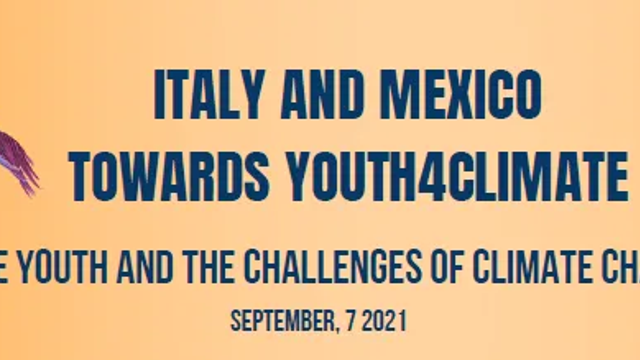Italy and Mexico towards Youth4Climate
On the occasion of Youth4Climate, the Pre-COP26 initiative that took place in 28-30 September 2021 in Milan, Italy; SDSN Mexico was humbled to host a meeting regarding climate change for young activists in partnership with The Embassy of Italy in Mexico and The Association of Italian Researchers in Mexico (ARIM). This event had the purpose of highlighting the importance of the youth and the academy's involvement regarding knowledge outreach and social awareness of climate change effects.
The seminar was inaugurated by Amb. Luigi De Chiara, Ambassador of Mexico in Italy; Mr. José Manuel Saniger Blesa, Secretary for Research and Development of the Coordination of Scientific Research at UNAM and Cocoordinator of SDSN Mexico for the UNAM; Mrs. Camila Zepeda Lizama, General Director for Global Issues at the Ministry of Foreign Affairs of Mexico; and Mrs. Silvia Limoncini, Italy’s special envoy on climate change.
The panelists underscored the need to comprehensively engage the youth in international negotiations, recognizing their role as agents of change and the acuteness of creating long-lasting action plans to mitigate the effects of climate change. Furthermore emphasis was also placed on the relevance of this negotiation process at a time when transitioning to a sustainable development model is both imperative and a moral
responsibility in order to build back better for future generations, guaranty the effective protection of global public goods and the equitable distribution of wealth within societies.
Afterwards, a panel of distinguished researchers was moderated by Mr. Simone Lucatello, President of the Italian Alliance for Sustainable Development (ASviS), who was joined in a conversation by Mr. Piero Leonelo, Professor of oceanography and atmospheric physics at the University of Salento; Mr. Francisco Estrada Porrúa, Coordinator of the Climate Change Program at UNAM; and Mr. Luis Fernández Carril, Sustainability Coordinator in the Sustainable Development and Relationship Directorate at Tecnológico de Monterrey. Mr. Piero Leonelo brought to the conversation the urgency of reducing the use of fossil fuels in order to constrain the rise of the global sea level. Especially taking into account the impending danger that it represents for coastal zones and the increased frequency that extreme weather events will have in the present century. In the same line, Mr. Francisco Estrada pointed out that cities will be especially vulnerable due to the intertwine of climate risks, such as heat waves. He further explained that climate change will have significant economic costs in the future, as it is estimated that annual losses will be equal or above 5% of local GDP in Mexico. Finally, Mr. Luis Carril suggested the need to understand the risks of climate change from an ethical perspective by remembering that international treaties are usually constraint to the mitigation and adaptation to the climate crisis, leaving behind the allocation of legal responsibility and the compensation that it has on communities.
During the last part of the event, Amb. Miguel Ruiz Cabañas Izquierdo, Director of the Sustainable Development Goals initiative at Tec de Monterrey, moderated a discussion with young activists who participated in Youth4Climate in representation of Italy and Mexico in Milan.
From the Italian delegation, the ambassador was joined by Daniele Guadagnolo, Co-Founder and Chief Marketing Officer at Change for Planet, and Federica Gasbarro, student of biological sciences at the University of Rome Tor Vergata. They focused on the need to leverage the platform of Youth4Climate in order to propose concrete solutions on the mitigation of climate change effects to political leaders. Not solely to represent the voices of the youth at the negotiation table, but also to create action plans that can be discussed at different levels of political and social
intervention.
On the other side of the table, Brenda Aylén Rodríguez Orea and Iván Daniel Martínez Pichardo, students of International Relations at Tec de Monterrey and UNAM, represented the Mexican delegation at the conversation. They highlighted the need of considering climate justice as a pillar in the development of national public policy, supporting communities in their fight against extractivism and including critical worldvisions from the Global South to better protect nature. These, in order to comprehend the climate crisis from its complexity, understanding its economic, social and political dimension; without loosing sight of the important role that the private sector and the civil society have in the issue. Especially in transitioning to renewable, decentralized and democratic energetic matrices.
Lastly, Paola Mariana Carrasco Hernández, an engineer in Sustainable Development from Tec de Monterrey, closed the panel by inviting young people not to settle with the paradigm that has been constructed of them as victims of climate change, but to take advantage of their power to influence political decisions. She also pointed out the relevance of international cooperation for the development and global governance, hoping that the COP26 can be a platform to share lessons learned regarding energetic transition and the need of involving more actors to more easily mitigate climate change effects.
With this enriching experience, the panel finished with high expectations on the Pre-Cop26, hoping that it would be a space of involvement and strong commitment from both the youth and political leaders, where the proposed solutions are concrete, and therefore, valued by political leaders to be present in the Conference of Parties 26 in Glasgow, United Kingdom.
